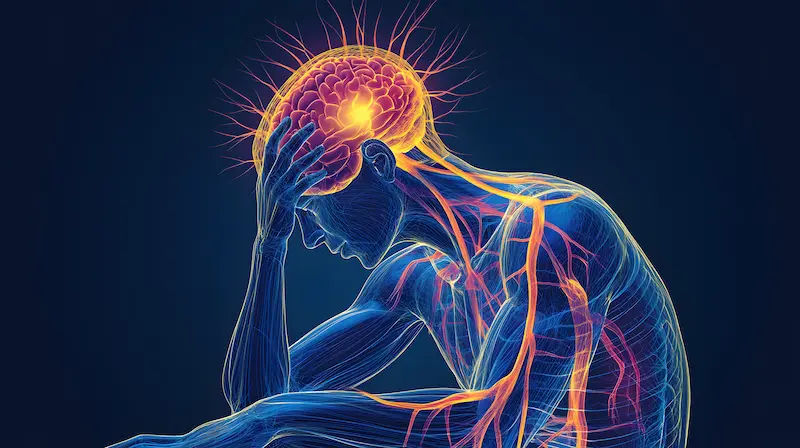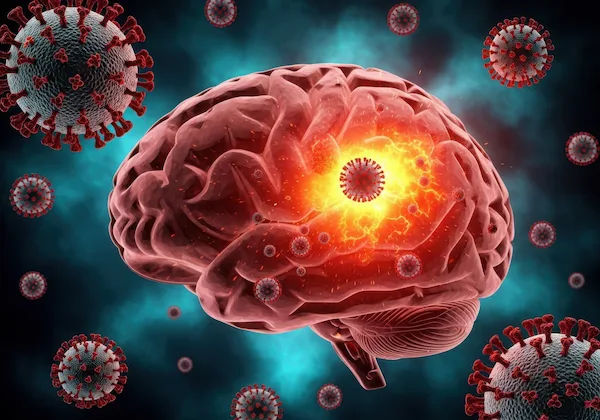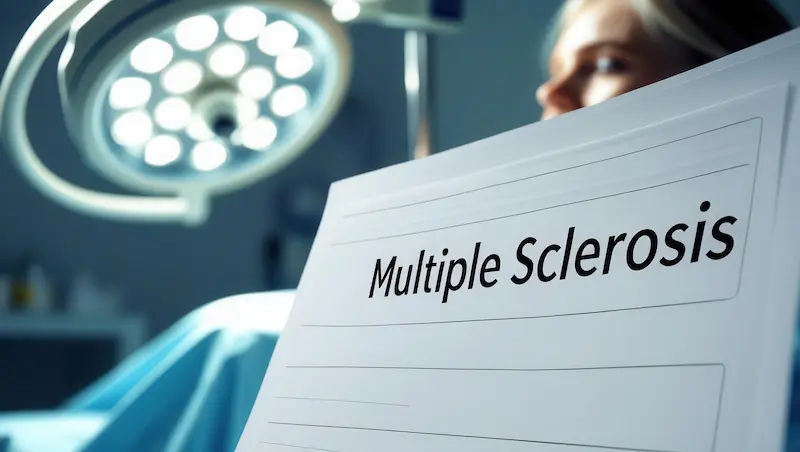Signs of Multiple Sclerosis: Recognizing Early Symptoms and Types
Learn to recognize the early signs of Multiple Sclerosis (MS) and understand its types, causes, diagnosis, and treatment options. Discover how prompt intervention, lifestyle changes, and modern therapies can help manage MS effectively.

Written by Dr. Shaik Abdul Kalam
Reviewed by Dr. Rohinipriyanka Pondugula MBBS
Last updated on 13th Jan, 2026

Introduction
Multiple Sclerosis (MS) is a complex and often misunderstood neurological condition that affects millions of people worldwide. It’s a disease where the body's own immune system mistakenly attacks the protective covering of nerve fibers in the central nervous system, leading to a wide range of unpredictable symptoms. For anyone newly diagnosed, experiencing early signs, or supporting a loved one, understanding this condition is the first step toward effective management. This article will guide you through the early warning signs of MS, break down its different types, explain how it’s diagnosed, and shed light on the latest approaches to living a full life despite the diagnosis. Recognizing these signs early can lead to prompt intervention, which is crucial for slowing the disease's progression and managing its impact.
What is Multiple Sclerosis? An Autoimmune Misfire
At its core, Multiple Sclerosis is an autoimmune disorder. This means the immune system, which is designed to protect you from foreign invaders like viruses and bacteria, gets confused and launches an attack on the body's own tissues. In the case of MS, the target is the central nervous system (CNS)—the brain, spinal cord, and optic nerves.
The Central Role of the Myelin Sheath
Nerve fibers throughout your CNS are insulated by a fatty substance called myelin. Think of myelin as the protective plastic coating on an electrical wire. This sheath allows electrical impulses to travel quickly and efficiently along the nerve cells, ensuring smooth communication between your brain and the rest of your body.
How MS Disrupts Nerve Signaling
In MS, the immune system's attack causes inflammation that damages and eventually destroys the myelin sheath—a process known as demyelination. This damage leaves scars, or sclerosis (also called plaques or lesions). When the myelin is damaged, the electrical impulses traveling along the nerves are slowed down, distorted, or completely blocked. This faulty communication between the brain and the body is what produces the diverse and often disabling symptoms of MS.
Early Signs and Symptoms of Multiple Sclerosis
The early signs of MS can be vague and easily mistaken for other conditions. They vary dramatically from person to person, depending on which part of the CNS is affected. However, some symptoms are more common at onset than others.
Common Early Warning Signs
#Numbness and Tingling
One of the most frequent initial symptoms is altered sensation. This can include numbness, tingling (a "pins and needles" sensation), or a burning feeling in the face, body, arms, or legs. It often occurs on one side of the body at a time.
#Vision Problems (Optic Neuritis)
Partial or complete loss of vision, usually in one eye, is a common early sign. It is often accompanied by pain during eye movement. Other vision issues include blurred vision, double vision (diplopia), or seeing washed-out colors.
#Fatigue and Weakness
An overwhelming sense of fatigue that is out of proportion to exertion is a hallmark of MS. This isn't ordinary tiredness; it's a debilitating exhaustion that can severely impact daily activities. Unexplained weakness, often in the legs, can also occur.
"MS Hug" and Other Uncommon Symptoms
A less common but distinctive early symptom is the "MS hug." This is a sensation of squeezing or pressure around the torso, like being wrapped in a tight band. Other potential early signs include balance problems, dizziness, muscle stiffness or spasms, and bladder dysfunction. A specific sign called Lhermitte's sign—an electric shock-like sensation that runs down the spine and into the limbs when bending the neck forward—is also a classic red flag.
The Four Main Types of Multiple Sclerosis
MS doesn't follow the same path for everyone. Understanding the different types of multiple sclerosis is crucial for prognosis and treatment. The disease course is generally categorized into four main types.
Clinically Isolated Syndrome (CIS)
CIS refers to a first episode of neurological symptoms that lasts at least 24 hours and is caused by inflammation and demyelination in the CNS. Not everyone who experiences CIS will develop MS. A diagnosis of MS is only confirmed if a second episode occurs or an MRI shows new lesions over time.
Relapsing-Remitting MS (RRMS)
This is the most common form of MS, affecting about 85% of people initially diagnosed. RRMS is defined by clear attacks of new or increasing symptoms (relapses). These are followed by periods of partial or complete recovery (remissions), where symptoms may improve or disappear entirely. During remissions, the disease does not progress.
Secondary Progressive MS (SPMS)
Many people with RRMS will eventually transition to SPMS. In this secondary progressive phase, the disease begins to progress more steadily, with or without evidence of relapses. There is a gradual worsening of neurological function and accumulation of disability over time.
Primary Progressive MS (PPMS)
Approximately 15% of people with MS are diagnosed with PPMS. From the onset, they experience a steady worsening of neurological function without distinct relapses or remissions. The rate of progression may vary, with occasional plateaus and temporary minor improvements.
What Causes MS? Unraveling the Triggers
The exact cause of multiple sclerosis remains unknown, but it is believed to be triggered by a combination of genetic susceptibility and environmental factors.
The Role of Genetics and Family History
MS is not directly inherited, but having a first-degree relative (parent or sibling) with MS increases an individual's risk. This suggests a genetic predisposition to developing the disease, though no single "MS gene" has been identified.
Environmental and Viral Links
Geography plays a role; MS is far more common in countries farther from the equator. Low levels of vitamin D (which we get from sunlight) are being heavily investigated as a risk factor. Certain viruses, notably the Epstein-Barr virus (which causes mononucleosis), have also been strongly linked to the development of MS, though the exact mechanism is still being studied.
Consult Top Specialists for Personalised Tips
Diagnosing Multiple Sclerosis: The Path to Clarity
There is no single test for MS. Diagnosis involves a combination of tools and requires evidence of damage in at least two separate areas of the CNS that occurred at different points in time. This process helps rule out other conditions with similar symptoms.
The McDonald Criteria
Neurologists use the McDonald Criteria, which incorporates clinical findings, MRI scans, and sometimes other tests to speed up an accurate diagnosis while maintaining precision.
Key Diagnostic Tests
MRI Scan: This is the most important tool. It can reveal the characteristic lesions (scars) in the brain and spinal cord.
Lumbar Puncture (Spinal Tap): Analyzing cerebrospinal fluid can show abnormalities in antibodies that are often present in people with MS.
Evoked Potentials: These tests measure the electrical activity in the brain in response to stimuli and can detect slowed nerve signaling.
If you are experiencing a combination of these neurological symptoms, it is essential to consult a specialist. For a comprehensive evaluation, you can book a consultation with a expert Neurologist on Apollo24|7 who can guide you through the diagnostic process.
Living Well with MS: Management and Outlook
While there is currently no cure for MS, it is a highly manageable condition. Treatment focuses on speeding recovery from attacks, slowing disease progression, and managing symptoms.
Disease-Modifying Therapies (DMTs)
A revolution in MS care, DMTs are designed to reduce the frequency and severity of relapses and slow the accumulation of lesions. For those with relapsing forms of MS, including RRMS and active SPMS, these drugs can significantly alter the disease's long-term course.
Managing Relapses and Specific Symptoms
Severe relapses are often treated with corticosteroids to reduce nerve inflammation. Other treatments target specific symptoms like fatigue (with energy-management strategies), muscle spasticity (with medication and physiotherapy), and neuropathic pain.
The Importance of Diet and Exercise
A balanced diet and regular physical activity are vital. Physical therapy helps maintain mobility and strength, while occupational therapy can help adapt daily activities. Managing overall health, including mental health, is a critical component of living well with MS.
Conclusion
Understanding the signs and types of Multiple Sclerosis is empowering. This disease, with its myriad of symptoms and unpredictable course, can be daunting. However, immense progress has been made in its treatment and management. Recognizing the early warning signs—be it unexplained numbness, a sudden vision change, or overwhelming fatigue—is the crucial first step. If you or someone you know is experiencing these symptoms, seeking expert neurological advice is paramount. With an accurate diagnosis, a growing arsenal of effective therapies, and a strong support system, people with MS can lead active, fulfilling lives. The journey with MS is unique for every individual, but it is a journey that does not have to be walked alone. If your condition does not improve after trying basic rest and recovery, consider booking a physical visit to a doctor with Apollo24|7 for a thorough neurological assessment.
Consult Top neurologist
Consult Top Specialists for Personalised Tips

Dr. Rajendra Prasad
Spine Surgeon
36 Years • MBBS. FRCS (Glas) U.K FRCS (Neurosurgery) Intercollegiate Specialty Board in Neurosurgery (U.K). Fellowship in Spine Surgery, Stanmore, London U.K. Specialist Registration in Neurosurgery with General Medical Council. U.K
Delhi
Apollo Hospitals Indraprastha, Delhi

Dr. Devashish Vyas
Interventional Neurologists
8 Years • MD (Medicine), DNB (Neurology), FNVI
Ahmedabad
Apollo Hospitals Gandhinagar, Ahmedabad

Dr. Abhisek Nanda
Neurologist
10 Years • DM (NEUROLOGY) ,DNB(MEDICINE)
Rourkela
Apollo Hospitals, Rourkela, Rourkela
(150+ Patients)

Dr Justin Thomas
Neurologist
10 Years • MD DM NEUROLOGY
Bhopal
Apollo Sage Hospitals, Bhopal

Dr. Boby Varkey Maramattom
Neurologist
22 Years • MD, DM (neurology), EDSI, FRCP, FICCN
Angamaly
Apollo Hospitals Karukutty, Angamaly
(25+ Patients)
Consult Top neurologist

Dr. Rajendra Prasad
Spine Surgeon
36 Years • MBBS. FRCS (Glas) U.K FRCS (Neurosurgery) Intercollegiate Specialty Board in Neurosurgery (U.K). Fellowship in Spine Surgery, Stanmore, London U.K. Specialist Registration in Neurosurgery with General Medical Council. U.K
Delhi
Apollo Hospitals Indraprastha, Delhi

Dr. Devashish Vyas
Interventional Neurologists
8 Years • MD (Medicine), DNB (Neurology), FNVI
Ahmedabad
Apollo Hospitals Gandhinagar, Ahmedabad

Dr. Abhisek Nanda
Neurologist
10 Years • DM (NEUROLOGY) ,DNB(MEDICINE)
Rourkela
Apollo Hospitals, Rourkela, Rourkela
(150+ Patients)

Dr Justin Thomas
Neurologist
10 Years • MD DM NEUROLOGY
Bhopal
Apollo Sage Hospitals, Bhopal

Dr. Boby Varkey Maramattom
Neurologist
22 Years • MD, DM (neurology), EDSI, FRCP, FICCN
Angamaly
Apollo Hospitals Karukutty, Angamaly
(25+ Patients)
More articles from Multiple Sclerosis
Frequently Asked Questions
What are usually the first signs of MS?
The most common first signs include numbness or tingling in the limbs, vision problems (like painful loss of vision in one eye or double vision), and significant fatigue that doesn't improve with rest.
What is the life expectancy for someone with multiple sclerosis?
Most people with MS have a normal or near-normal life expectancy. While the disease can cause disability, it is rarely fatal. Advances in treatment and management continue to improve long-term outcomes and quality of life.
Is multiple sclerosis a hereditary disease?
No, MS is not directly hereditary. However, having a close relative (like a parent or sibling) with MS does slightly increase your risk, suggesting a genetic predisposition that interacts with environmental factors.
What is the difference between RRMS and PPMS?
RRMS (Relapsing-Remitting MS) is characterized by defined attacks (relapses) followed by periods of recovery (remissions). PPMS (Primary Progressive MS) involves a steady worsening of neurological function from the onset, without distinct relapses.
Can stress cause an MS flare-up?
While stress does not cause MS, it is a well-known trigger for worsening symptoms and can contribute to the onset of a relapse. Effective stress management is an important part of managing the disease.



.webp)
